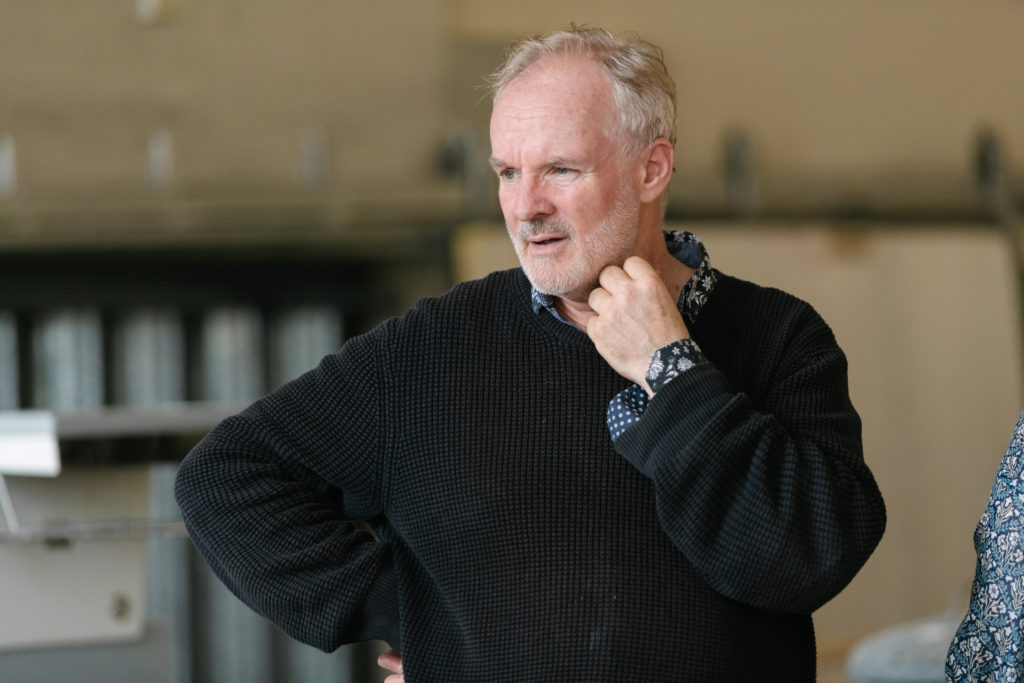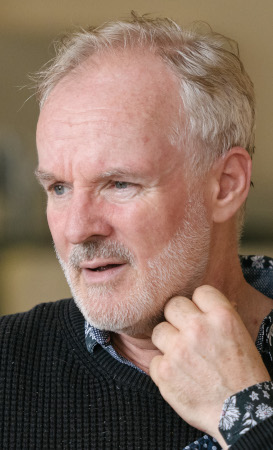
Jeremy Sams brings the iconic 70s British sitcom THE GOOD LIFE to the stage for the first time ever appearing at Bath Theatre Royal and Cheltenham Everyman in October.
Asked if he thinks his stage adaptation of 70s sitcom The Good Life resonates now, Jeremy Sams laughs and says: “Totally. I’ve spent the last 18 months or so looking at people’s pictures of homemade sourdough on social media and noting the pride they take in it!”
When the TV show premiered in 1975, Tom and Barbara Good (as portrayed by Richard Briers and Felicity Kendal) were the poster couple for self-sufficiency as they opted out of regular life to become suburban eco-warriors, growing their own produce by turning their garden into an allotment, raising livestock and generating their own electricity.
“And since lockdown the idea of self-sufficiency, as well as their allotments if they have them, has become a huge part of people’s identities,” Sams notes. “It’s not just because of empty supermarket shelves, it’s also a reaction to all the preservatives and what-have-you that is put into our food.”
At the start of the first series, fed-up 40-year-old Tom quit his job as a draughtsman. “And the idea of being your own boss is unbelievably current now,” Jeremy adds, “that and the concept of working from home. Even if they aren’t quitting, people are saying ‘No, I’m not going to commute, make that journey and kill the planet, I’m going to spend more time in my house and my garden, if I’m lucky enough to have one’. What surprises me is just how timely this story is.”
One of the biggest TV hits of the 70s as well as one of the most beloved sitcoms of all time, The Good Life was penned by Bob Larbey and John Esmonde (of Please Sir! fame) and was an immediate hit when it premiered in April 1975. And it went from hit to sensation, with viewing figures starting at five million and eventually averaging 16 million.
Focussing on middle-class suburbanites Tom and Barbara and their decision to drop out of the rat race – much to the horror of their snobby neighbour Margo Leadbetter and her henpecked husband Jerry (Penelope Keith and Paul Eddington) – it ran for four series across three years, culminating in a finale that was recorded in front of none other than The Queen and The Duke of Edinburgh.
With a varied CV that includes directing a revival of Michael Frayn’s classic farce Noises Off and Chitty The Musical (for which he was nominated for an Olivier Award), translations of The Marriage of Figaro and The Threepenny Opera and composing numerous stage and TV scores, Sams is a multi-tasker who has written The Good Life adaptation and is also directing the UK tour.
The first time these iconic characters have been portrayed on stage, the show starts like the TV series with Surbiton-dweller Tom deciding to quit work and go self-sufficient. The tour kicks off at the Theatre Royal Bath on October 7th and wends its way around the country before it reaches the Chichester Festival Theatre at the end of November, with Jeremy promising “it’s a homage to the characters as well as an old-fashioned comedy” that captures the spirit of the TV show whilst inventively rejigging the story.
The set features the neighbouring homes that will be familiar to fans of the sitcom, with the action revolving between the two, and there’s lots of period detail (70s food cans, retro kitchenware) and some familiar outfits. “And that’s another thing that’s timely,” the writer points out, “because for the past year and a half we’ve all been wearing jumpers with holes in, old jeans and pyjamas.”
The allotment is featured, as is Geraldine the goat, and Sams says of the script: “Good Life fanatics will spot other references here and there but it’s not a museum piece. A lot of it is my own invention, although there are some things you have to feature – like a snooty Margo, for example.”
Jeremy recalls seeing the TV show and loving it. “But from rewatching it I’d forgotten how sexy it was. It’s quite clear that Jerry fancies Barbara and Tom flirts with Margo. There’s a slight whiff of suburban shenanigans going on there, which I hadn’t spotted before, so I very much wanted to preserve that.”
Period-specific details include the menus for two dinner parties. “I had great fun planning those. You get chicken Kiev, Black Forest gateau and Mateus Rose. But what really came across to me again is not how 70s that is but how timeless it is. People today are still serving food to other people they want to impress that’s outlandish and weird and which in the next ten years will be looked on, I’m sure, as ridiculous and very 2021.”
Playing Tom is the actor, comedian and presenter Rufus Hound, whose wide-ranging CV includes Doctor Who and Cucumber on screen and One Man, Two Guvnors and Dirty Rotten Scoundrels on stage.
He didn’t hesitate to say yes to the show, noting: “You don’t really have to ask ‘What drew you to The Good Life?’ because it exists in British culture as one of the gold standard all-time greats – phenomenal comedy writing that really was state-of-the-nation whilst underlying all of it is was heart and warmth and care for people who may not agree with us but are still our neighbours and thus we have to get on. In 2021 that story feels like it’s unbelievably pertinent.”
After rewatching a show he originally saw in reruns, Rufus was interested to note just how theatrical it was. “It’s played so tightly and so theatrically, and there’s a live studio audience so they are playing it in real time. Watching those brilliant actors who had all gone through theatre bring the deftness, the quality, delivery, timing, all of those things to the fore is sublime.”
Hound admits it’s daunting taking on a character as revered as Tom but, having appeared in One Man, Two Guvnors after James Corden and following in Steve Martin’s footsteps in the Dirty Rotten Scoundrels musical, he’s no stranger to reinterpreting roles.“Of course it’s daunting but if you think about how daunting it is you’d never get started. Fortunately, as long as the show is good and you’re committed to telling the story, audiences quite quickly park what they remember it being previously and hopefully get swept up and bowled over by what’s happening in front of them.”
Known for everything from Bombay Dreams to EastEnders via Joseph and the Amazing Technicolor Dreamcoat and School of Rock, Preeya Kalidas is thrilled to be playing Margo, saying: “It’s incredible getting to play a character who is so well-loved but also getting the opportunity to recreate this part for the stage – to go through her backstory and her journey with Jerry and to work out what makes Margo Margo.”
Preeya isn’t worried about following Penelope Keith’s BAFTA-winning turn. “We’ve got a fantastic script to work with. Jeremy has such brilliant ideas for it and a clear vision for what it is that he wants. Plus it’s about the characters, not the people who played them. I haven’t rewatched it because I don’t want to be influenced by Penelope Keith’s choices.”
And the actress is an admirer of Margo, explaining: “I know women who are like her – who are bolshy and a bit snobby and take care of themselves, are quite audacious and don’t mince their words. I think some of those are great qualities. You know where you stand with Margo.”
Dominic Rowan is Jerry to Preeya’s Margo and agrees that the story very much resonates today. “There are environmental issues and also ethical ones of ‘What do I want?’ and ‘What is the good life?’ Then there’s the work-life balance, where traditional working structures are changing. It’s not ‘Oh my God, it’s so long ago and don’t they dress funny?’ It’s people facing similar problems to the ones we’re facing today.”
The actor, who has worked extensively in theatre as well as in Law & Order: UK and The Crown on TV, is intrigued by the dynamics of the four leads. “You’ve got that mirroring thing of two couples who have more in common than they might think. They start off from somewhere similar, then move off on different trajectories. It asks: ‘How do you remain friends? Is there an alternative way of living?’ But because it’s in a suburban setting it doesn’t become abstract. It’s a real-world working out of ‘What do I want? Where do I come from? Where am I going?’ and it’s done with a lot of warmth.”
Completing the cast is Sally Tatum as Barbara. The actress, comedian and writer’s stage credits include Present Laughter, Gaslight and Twelfth Night and, like her co-stars, she is doing her own take on an iconic character. “I’m trying to approach it like it’s new,” she says, “and not think of playing Felicity Kendal. We have to approach it as a new play and new characters.”
She watched a few episodes before auditioning. “Then I actively decided not to watch any more once I got the job because then you’re in danger of doing an impression, which I want to avoid.”
She too feels the themes have contemporary resonance today. “Especially post-lockdown, so many people are taking stock, looking at their lives and thinking ‘Do we have to live in the city? Can we move further out?’ And even if they are in suburban places, they’re thinking about sustainability and there’s so much focus on climate. I think it really will resonate with people who are looking at life differently now.”
Asked why he thinks people are still so fond of these characters more than four decades after they drew the shades on their Surbiton lives, Jeremy Sams muses: “I think it’s because they’re nice. When I started writing it I thought ‘Are these the classic nightmare neighbours you get next door, like the ones you often see on Channel 5 docuseries?’ But they’re actually really nice people who like and want the best for each other. They just differ. They read different newspapers and have different politics. They all have a vested interest in the quality of life, they just have differing views as to what quality means.”
As for what he hopes audience will feel as they leave the theatre, the writer-director says: “I’m hoping it will be a laughter-generating machine but for me laughter only comes from character. You can’t just have four strangers and demand laughs. You have to get to know them, you have to get to know their aspirations and foibles.
“Everyone in this show is flawed. They’re bad-tempered, they’re irritable, vain and insecure. The names are rather obvious: The Goods are good and the Leadbetters think they’re better. But they’re all doing their best and I hope audiences will be delighted, not just by their memories of the TV show but also by how relevant it is today.”
The Good Life is at Bath Theatre Royal from 7th – 16th October and at the Everyman in Cheltenham from 19th – 23rd October


